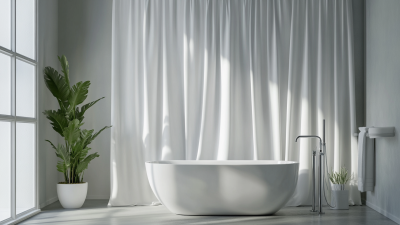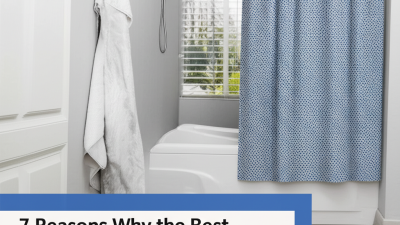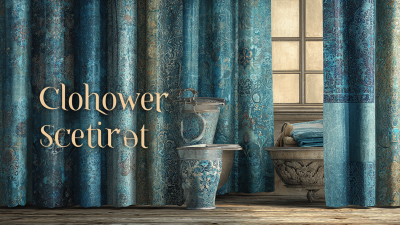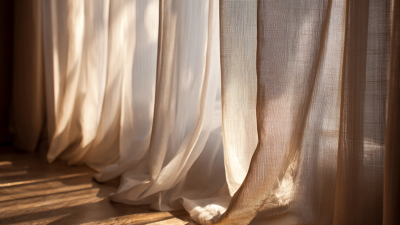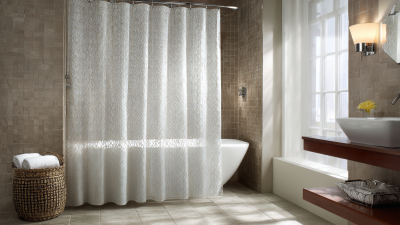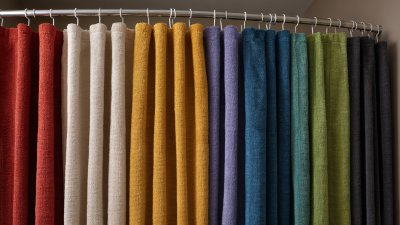When it comes to bathroom designs, shower curtain PVC has become a popular choice for many homeowners due to its affordability and versatility. According to a report by Grand View Research, the global market for shower curtains, particularly those made from polyvinyl chloride (PVC), is expected to witness significant growth, driven by rising renovation activities and the increasing demand for stylish yet functional bathroom accessories. However, while shower curtain PVC offers ease of maintenance and a wide variety of designs, it is essential to recognize the common issues associated with this material. Health concerns over chemical emissions, potential environmental impact, and durability challenges can pose significant drawbacks for consumers. Understanding these common issues with shower curtain PVC is crucial for making informed decisions that not only enhance aesthetic appeal but also ensure a healthier living environment.

When it comes to choosing shower curtains, PVC (polyvinyl chloride) curtains are a popular option due to their affordability and water resistance. However, there are common problems associated with PVC shower curtains that consumers should be aware of. One significant issue is the release of volatile organic compounds (VOCs). A study conducted by the Silent Spring Institute found that new PVC shower curtains emit harmful chemicals that can contribute to indoor air pollution. Among these, phthalates—known endocrine disruptors—are prevalent, raising health concerns especially for pregnant women and young children.
Another issue is the long-term durability of PVC materials. While these curtains may initially appear sturdy, they tend to wear out quickly, often resulting in mold and mildew growth. According to the National Sanitation Foundation, shower curtains can harbor bacteria and mold, which thrive in the damp bathroom environment. To minimize health risks, it's recommended to wash PVC curtains regularly and consider alternatives, such as PEVA (polyethylene vinyl acetate) curtains, which are chlorine-free and less likely to release harmful substances. Making informed choices about shower curtain materials is essential for maintaining a healthy home environment.
| Issue | Description | Potential Solutions |
|---|---|---|
| Chemical Smell | PVC shower curtains often release a strong plastic odor when new, which can be unpleasant. | Air out the curtain in a well-ventilated area, or wash it with mild soap and water before use. |
| Mold and Mildew Growth | Moisture accumulation can lead to mold and mildew on PVC curtains, posing health risks. | Regular cleaning with vinegar or a mild detergent can help inhibit growth. |
| Brittleness and Cracking | Over time, PVC can become brittle and crack, especially in cold conditions. | Replace curtains that show signs of brittleness, and store them in a temperature-controlled area. |
| Static Cling | PVC curtains can generate static electricity, causing them to cling to the body or wall. | Use fabric softener sheets on the curtain to reduce static, or consider alternative materials. |
| Limited Design Options | PVC curtains may have limited styles and colors compared to fabric ones. | Explore other materials or shop from a variety of online retailers for more choices. |
The use of PVC (polyvinyl chloride) in shower curtains has raised significant health concerns due to the potential release of harmful chemicals. According to a study published in the Journal of Exposure Science & Environmental Epidemiology, PVC shower curtains can emit volatile organic compounds (VOCs) such as phthalates, which are known to disrupt hormonal systems and may lead to reproductive and developmental issues. The presence of these chemicals in enclosed spaces can result in adverse health effects, particularly for vulnerable populations such as pregnant women and children.
Another important consideration is the potential for the accumulation of mold and mildew on PVC curtains, which can contribute to respiratory problems. A report by the Consumer Product Safety Commission highlighted that the moisture retention of PVC materials creates an ideal environment for mold growth, leading to potential health risks for individuals with asthma or allergies. Moreover, the recycling of PVC is challenging, as only a small fraction is processed properly, leading to increased environmental concerns regarding plastic waste. As consumers become more aware of these risks, many are seeking safer alternatives, such as organic cotton or polyester shower curtains that are free from harmful chemicals.
The environmental impact of PVC production and disposal is a pressing concern as our society grapples with plastic pollution. According to recent studies, the production and processing of polyvinyl chloride (PVC) significantly contribute to environmental degradation. An estimated 457 million metric tons of fossil carbon-based polymers are produced annually, with PVC being a major contributor to these numbers. The life cycle assessment of different plastic types indicates that PVC's environmental footprint throughout its lifecycle is particularly adverse, encompassing resource extraction, manufacturing, and eventual disposal.
Research highlights the challenges associated with the end-of-life treatment of PVC. Many disposal scenarios result in increased greenhouse gas emissions and other harmful pollutants. For instance, burning plastic waste releases toxic byproducts, while landfilling PVC can lead to leachate that contaminates soil and water sources. Innovative recycling methods are being investigated, such as the use of ionic liquids for efficiently separating PVC from composite materials, which could potentially mitigate some environmental impacts. However, the need for effective waste management strategies remains critical, as the negative consequences of PVC and other plastics on biological ecosystems continue to escalate.
When it comes to maintaining your PVC shower curtain, regular care is essential to prolong its life and keep your bathroom looking fresh. One important tip is to routinely wipe down the curtain with a damp cloth and a mild detergent to remove soap scum and mildew. This simple practice prevents buildup and keeps the curtain clean without harsh chemicals.
Additionally, it's beneficial to give your curtain a thorough wash every few months. Most PVC curtains can be machine washed, but it's important to check the label for specific care instructions. Use a gentle cycle with cold water and avoid using fabric softeners, as they can degrade the material over time. After washing, hang the curtain back up to dry; it's crucial to ensure it dries completely to avoid mold growth.
Finally, consider using a shower liner made of mildew-resistant material to shield your PVC curtain from excessive moisture. This added layer not only helps maintain the curtain's condition but also enhances the overall aesthetic of your bathroom. By following these simple maintenance tips, you can ensure your PVC shower curtain remains a functional and stylish part of your home.
When it comes to shower curtains, PVC (polyvinyl chloride) is a common material, yet it raises several health and environmental concerns. A report by the Healthy Building Network indicates that PVC can release harmful chemicals, including phthalates and VOCs (volatile organic compounds), which can affect air quality and lead to potential health risks, particularly for vulnerable populations. With these concerns in mind, many consumers are looking for safer alternatives that don’t compromise on style or functionality.
Eco-friendly options such as organic cotton, hemp, or bamboo offer promising alternatives to conventional PVC shower curtains. According to a study by the Green Building Council, organic cotton curtains are not only biodegradable but also free from harmful chemicals, making them a safer choice for indoor environments. Additionally, many companies are now producing shower curtains coated with non-toxic, water-resistant treatments instead of PVC, ensuring that consumers can enjoy both aesthetic appeal and peace of mind. By opting for these eco-friendly materials, individuals can contribute to a healthier home and a more sustainable planet.
